Universal Credit debate to be extended by up to half an hourpublished at 13:00 BST 7 September 2017
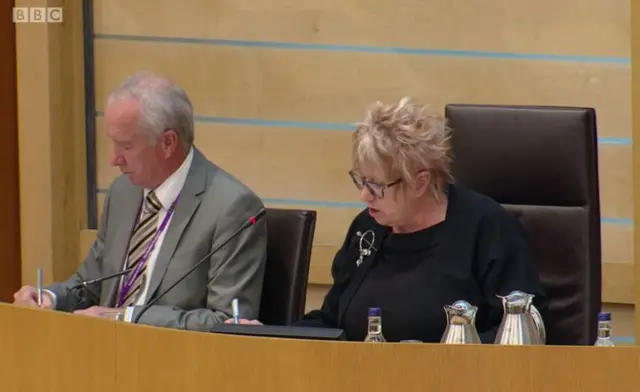 Image source, bbc
Image source, bbcDeputy Presiding Officer Christine Grahame
MSPs agree to extend this important debate by up to half an hour.
The Social Security Committee takes evidence from benefits claimants who took part in the 'Your Say' project
MSPs quiz Nicola Sturgeon during first minister's questions
Labour MSP Alex Rowley leads a debate calling for a stop to the accelerated roll-out of Universal Credit
MSPs continue to debate the programme for government
Craig Hutchison and Colin Bell
 Image source, bbc
Image source, bbcDeputy Presiding Officer Christine Grahame
MSPs agree to extend this important debate by up to half an hour.
Quote MessageUniversal credit has major delivery and design flaws which risk hurting families instead of helping them. These include long waits for payments that push people into crisis and debt, all the while battling a highly complicated process with little support."
Rory Mair, Chair of Citizens Advice Scotland
The Labour MSP highlights the above quote from CAS.
'The food bank has been a lifeline' after Universal Credit problems
Universal Credit is creating financial problems for thousands of people across the UK - says a report by the Citizen's Advice charity.
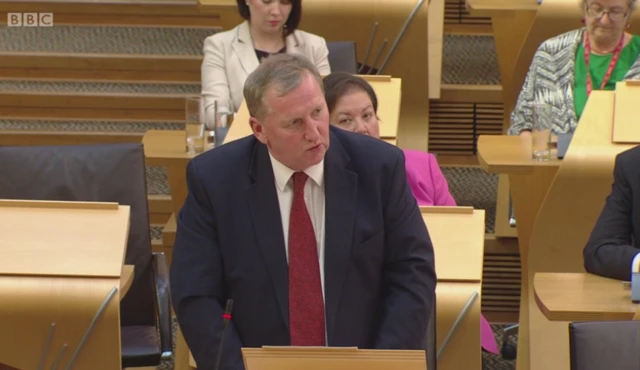
Mr Rowley says it is clear that something needs to be done to resolve issues but the Tories seem to be "burying their heads in the sand".
The Labour MSP says he has written to Scottish Conservative leader Ruth Davidson on this but has received no reply.
He says the Tories are "driving up poverty in our country" and that "it is not right to simply ignore this."
Mr Rowley says the Tories do not understand what day-to-day life is like for many people in the country.
"It is clear the system if flawed and we should work together to resolve that," he says.
He calls on parliament to support the halt to the roll-out.
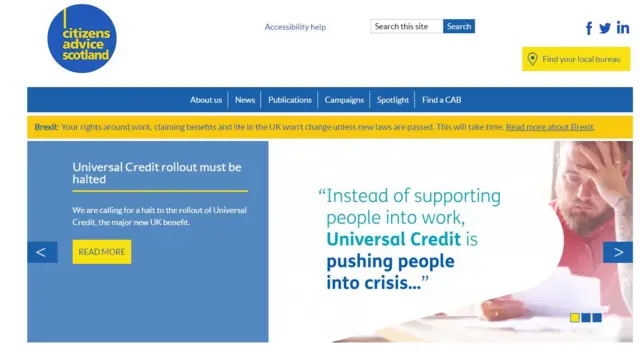 Image source, CAS
Image source, CASCAS
Citizens Advice Scotland has called for a halt to the accelerated roll-out of Universal Credi, externalt, publishing new figures which show the system risks leaving thousands of Scots in poverty and debt.
The umbrella body for Citizens Advice Bureaux in Scotland says the roll-out should be paused until significant issues with the system are addressed.
Universal Credit aims to replace six existing benefits with one single payment, making access to social security payments less complicated and to support people into work. It has been rolled out initially in parts of Scotland and is due to be introduced in full across the country by the end of 2018, starting in October this year.
However, Citizens Advice Bureaux says evidence in initial roll-out areas has shown that the reality of Universal Credit risks leaving many Scots without the support they need, pushing them into debt and leaving them unable to make ends meet. The long wait for payments (six weeks) at the beginning of the Universal Claim process is a particular cause of problems, and many are finding the system very complicated, making it harder to focus on getting into work.
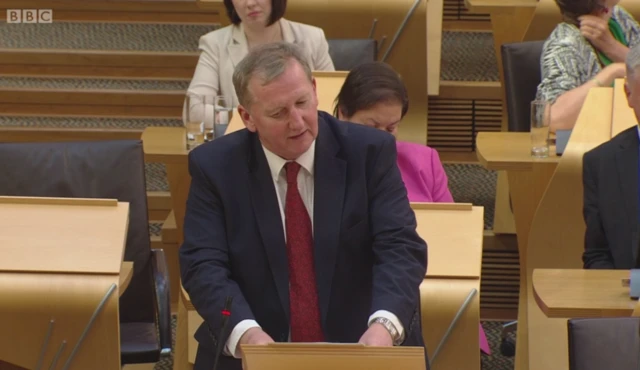
Labour MSP Alex Rowley says he is bringing forward his motion to build support in the Scottish Parliament.
Mr Rowley asks why any government in a civilised society would continue to role out a policy which is driving people into poverty.
"This cannot be right and it is not right," he says.
He says organisations are being put under increasing pressure in trying to support people during this roll-out.
Allow X content?
This article contains content provided by X. We ask for your permission before anything is loaded, as they may be using cookies and other technologies. You may want to read X’s cookie policy, external and privacy policy, external before accepting. To view this content choose ‘accept and continue’.
Labour MSP Alex Rowley uses his motion to express concern over the reported evidence from Citizens Advice Bureaux regarding the initial roll-out areas in Scotland, and elsewhere in the UK.
Mr Rowley says CAS says this highlights that the reality of universal credit risks leaving many people in Scotland without the support they need, pushing them into debt and leaving them unable to make ends meet.
 Image source, bbc
Image source, bbcCAS highlights an increase in the use of foodbanks
The Labour MSP says he is also concerned that Citizens Advice Scotland has reported that evidence from initial roll-out areas shows that, since universal credit was introduced, bureaux have seen:
Labour MSP Alex Rowley will now lead a member's debate supporting the Citizens Advice Scotland call to stop accelerated roll-out of Universal Credit.
 Image source, Scottish Parliament
Image source, Scottish ParliamentHere is the motion in full
Presiding Officer Ken Macintosh chastises MSPs for having to much preamble in their questions.
That concludes first minister's questions.

The four main opposition parties have united in a call for MSPs to be allowed to choose the next chairperson of the Scottish Police Authority (SPA).
Andrew Flanagan resigned from the role in June after being heavily criticised by two Holyrood committees.
The Scottish government is due to interview candidates to replace Mr Flanagan next month.
But opposition parties want his successor to be appointed by the Scottish Parliament instead.
Lib Dem MSP Liam McArthur asks whether the government will provide an update on the management of Police Scotland and the Scottish Police Authority.
Ms Sturgeon say considerable work is underway on this.
Mr McArthur says reports suggest the independent inspectorate will be critical of the Scottish government's dismantling of the BTP in Scotland.
He calls for the next chair of the SPA to be appointed by the parliament.
Ms Sturgeon says she is not entirely unsympathetic and says minister will consider this.
'My nephew Graham was more than a drug death statistic'
The number of drug-related deaths in Scotland last year totalled 867, a rise of 23% on 2015.
Numbers have been steadily increasing since 1995, when 426 fatal overdoses were recorded.
The latest statistics from the National Records of Scotland, external showed more than 70% of deaths were among people aged 35 or over.
Critics say the continuing rise calls into question the effectiveness of the Scottish government's drugs strategy.
However, the minister for public health, Aileen Campbell, said "unfortunately" the figures for Scotland were representative of a general trend of increasing drug deaths "across the UK and in many other parts of Europe".
Scottish Labour MSP Monica Lennon asks what the government's response is to the reported significant increase in the number of deaths related to drug and alcohol misuse in the last year.
Ms Sturgeon says behind these numbers are individual tragedies.
She says the rise is due to many long-term drug users growing older.
The first minister says there is a link with previous austerity policies from the 80's.
She says the programme for government pledged an additional £20m for drug and alcohol services.
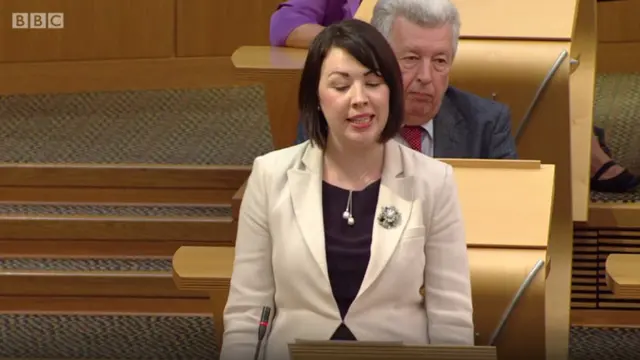
Ms Lennon raises the issue of stigma about drug and alcohol misuse and calls for it to end.
In an emotional contribution, she says she knows of this stigma because her father died due to alcohol two years ago..
Ms Sturgeon praises Ms Lennon for her courage for raising this issue and agrees those suffering from addiction must be seen as human beings.
 Image source, Getty Images
Image source, Getty ImagesMost teachers think there should be an exam at the end of National 4 courses, according to research from the qualifications agency.
The National 4 qualifications - introduced in 2014 - rely on coursework and assessment by teachers.
N4s are usually obtained in fourth year by students who might have studied for a Standard Grade at foundation or general level under the old system.
Some critics have described them as "worthless" because there is no exam.
Detailed research was carried out by the Scottish Qualifications Authority (SQA) to help them gauge views on the suite of new qualifications. National 4 and 5 qualifications in effect replaced Standard Grades three years ago while Highers and Advanced Highers have been revamped.
Researchers carried out fieldwork in at least one school in 31 of Scotland's 32 council areas, speaking to more than 200 teachers and several hundred pupils.
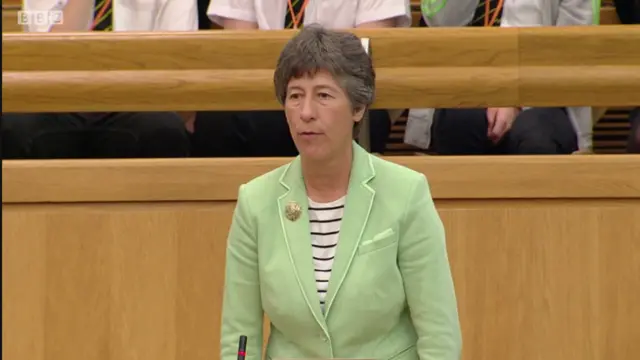
Scottish Conservative MSP Liz Smith asks what the government's response is to the concerns that have been expressed regarding the efficacy of the National 4 qualification.
Ms Sturgeon defends the National 4 qualification but accepts there are concerns there is not an external exam and says the qualification is under review.
Ms Smith asks why has it taken two and half years to start addressing the issues around the National 4.
The first minister says the review is being undertaken to address the concerns.
She says: "Let's make sure we don't undermine the achievement of young people who work hard gaining these qualifications".
 Image source, PA
Image source, PAMr Jones and Ms Sturgeon say their governments are working together to ensure devolution is not damaged by Brexit
The Scottish and Welsh governments are to put forward amendments to the UK government's Brexit legislation.
First ministers Nicola Sturgeon and Carwyn Jones met in Edinburgh in the latest move to coordinate opposition to the EU Withdrawal Bill.
They fear the Westminster government is planning to use the bill to launch a "power grab" of devolved powers.
The two governments said they would work together on amendments "to provide a constructive way forward".
The UK government insists there are no plans for a power grab, and says Brexit will actually see more powers devolved to both nations.
The talks are the latest in a series held between senior Scottish and Welsh government figures in recent weeks as the two administrations join forces in an attempt to secure a greater say.
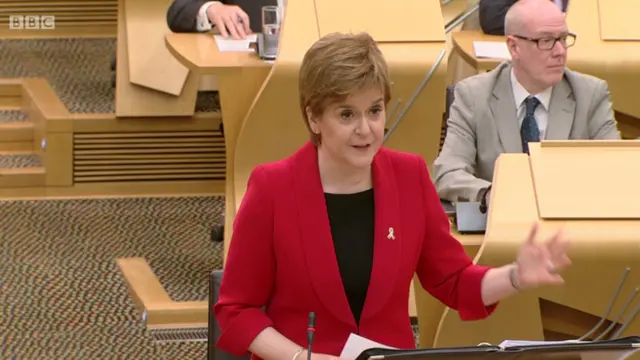 Image source, bbc
Image source, bbcSNP MSP Stuart McMillan asks what assurances the Scottish government has received regarding the transfer of powers to Scotland following Brexit.
Ms Sturgeon says she and the first minister of Wales will not recommend consent for EU (Withdrawal) Bill without appropriate amendments.
The first minister agrees with Mr McMillan's comments about it being a "naked power grab".
She says continuity legislation is being looked at.
Ms Sturgeon says there has not been a JMC meeting since February and the UK government is leading the UK blindly off a cliff edge and is treating the devolved countries with contempt.
 Image source, Park of Keir
Image source, Park of KeirThe Park of Keir development has received support from high-profile sporting figures including Judy Murray and Colin Montgomerie
The Scottish government says it intends to grant planning permission for a tennis and golf centre in Dunblane.
The £37.5m Park of Keir development, backed by Judy Murray, includes 12 tennis courts, a golf academy, hotel and visitor centre.
Developers had appealed to the Scottish government after the plan was rejected by Stirling Council.
Ministers decided the centre was of national and regional importance, and would benefit Scottish sport.
The plan - which also features sports pitches and 19 luxury houses - was approved, subject to conditions, despite a Scottish government-appointed reporter recommending that the appeal be refused., external
Allow X content?
This article contains content provided by X. We ask for your permission before anything is loaded, as they may be using cookies and other technologies. You may want to read X’s cookie policy, external and privacy policy, external before accepting. To view this content choose ‘accept and continue’.